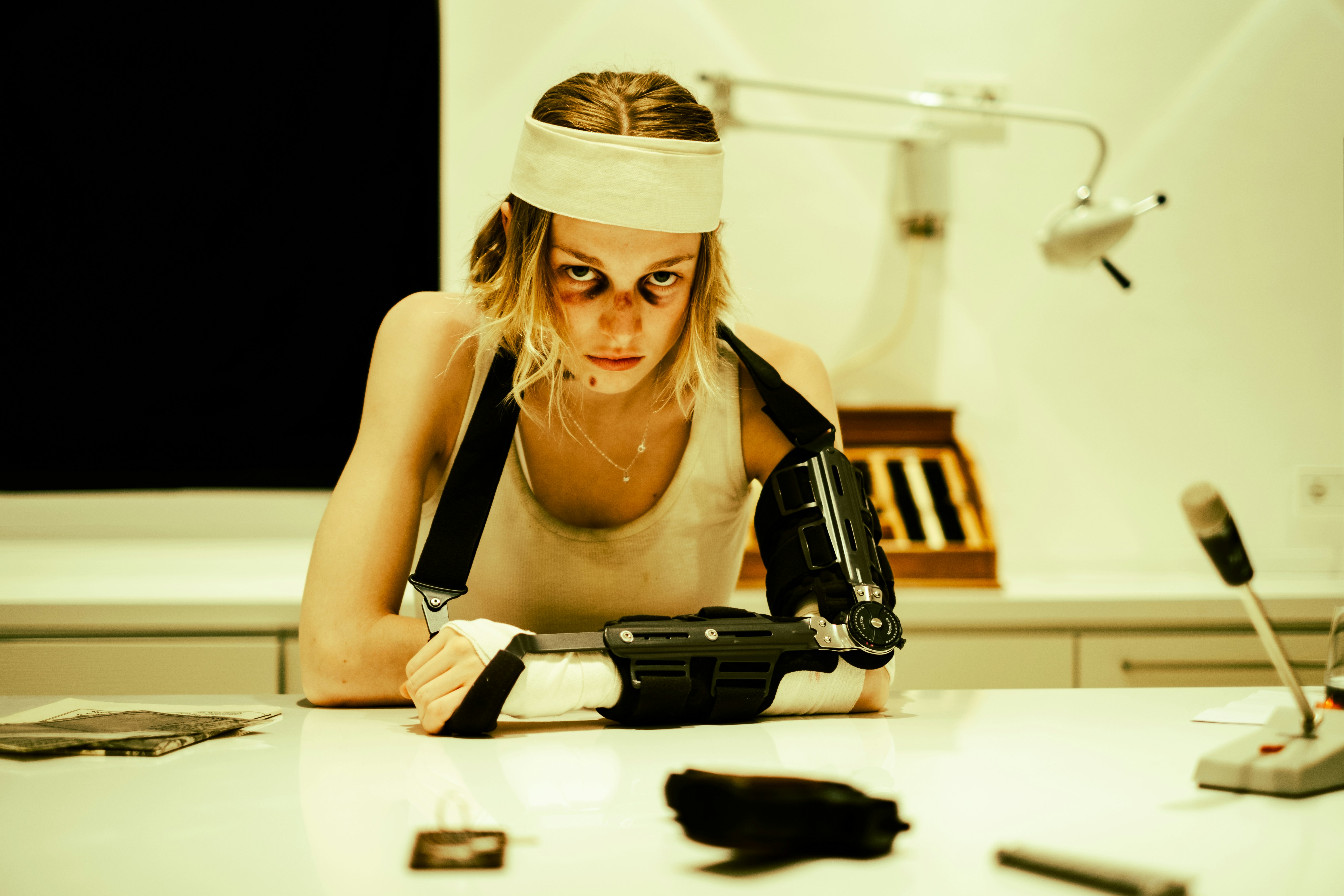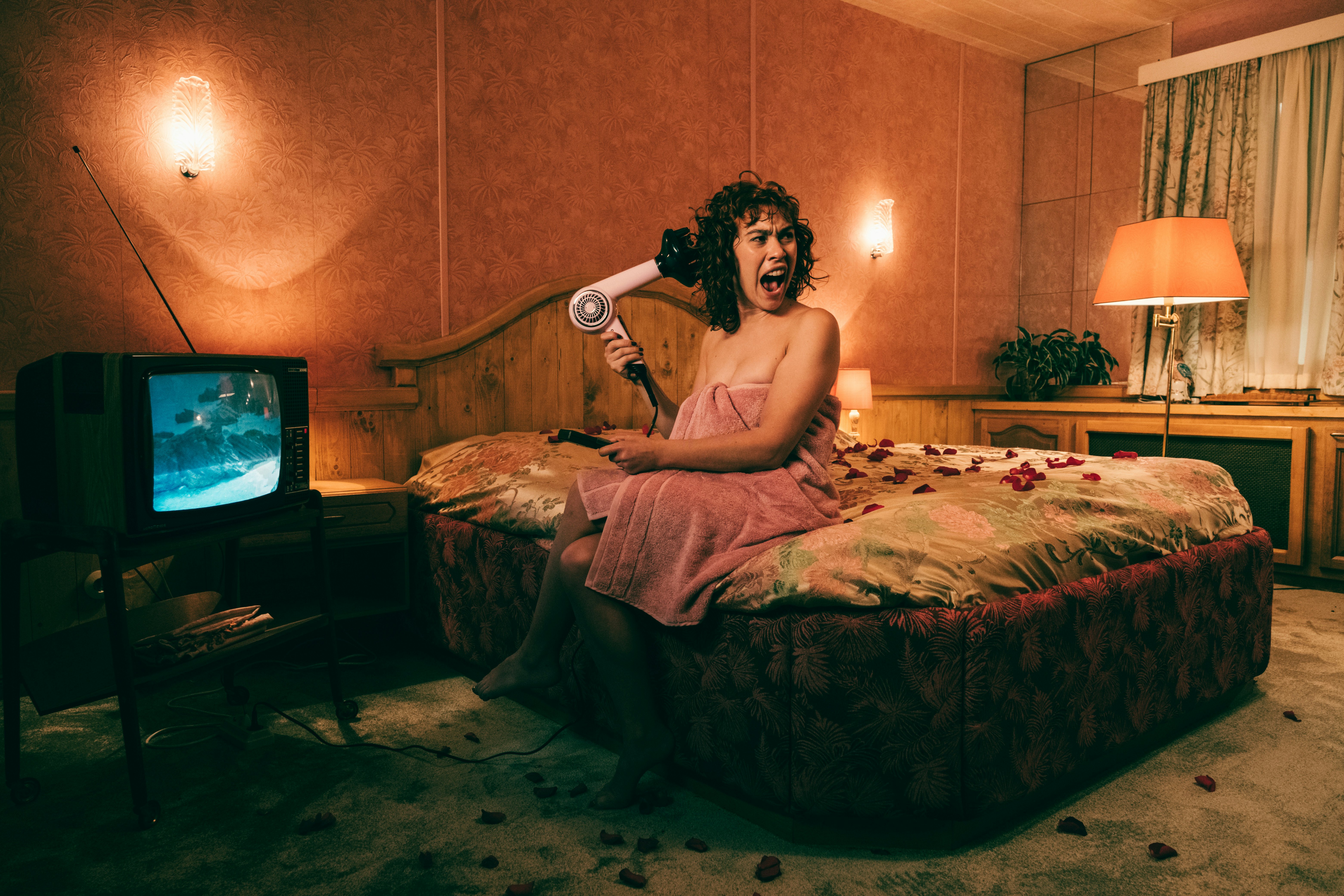
There’s something amiss at Herr König’s (Dan Stevens) idyllic resort in the German Alps in the surreal new thriller Cuckoo. Dazed female guests suddenly fall to bouts of vomiting. Strange chirping noises appear to trap people in time loops. And there’s the case of the creepy hooded blonde woman who appears at night, chasing and attacking surly teenager Gretchen (Hunter Schafer). But, oddly, Gretchen, who is reluctantly accompanying her father and his new family to the resort after her mother passed away, might be the only one who notices something is off.
“Gretchen is kind of like the baseline how most humans would react to a lot of the circumstances,” Schafer tells Inverse.
Spoilers ahead for Cuckoo.
Cuckoo’s Wild Twist, Explained

The circumstances only get stranger from there: when Gretchen is attacked multiple times by the Hooded Woman, no one believes her — not her harried father Luis (Marton Csokas) nor her cold and distant stepmother Beth (Jessica Henwick), who are only concerned about getting the specialized medical treatment for their mute daughter Alma (Mila Lieu) that is only offered at the resort. Stevens’ exceedingly creepy Herr König, however, takes a special interest in Gretchen after her assault, ingratiating himself into her life with frightening speed.
It all leads to a wildly, ahem, cuckoo third-act twist that reveals the true nature of the blonde woman: the entire resort is a breeding facility for these creatures, which impregnate the female guests with their own offspring. The children are then raised by their human hosts like their own, until they are brought back to meet their biological mother — and are triggered into transforming into the same, vicious creatures that Herr König keeps in captivity.

It’s a bizarre twist that feels like it has more basis in fairy tales about changelings than reality. But director Tilman Singer reveals that he took a perhaps not-so-surprising inspiration from nature.
“I watched a documentary about the cuckoo bird and how it breeds and what it does,” Singer tells Inverse, “and there was this shot about two tiny bird host parents that feed a cuckoo chick in a nest that grows larger than the nest, larger than them, and they still feed it. Their offspring are dead, but they don't abandon the nest. And that had a certain beauty, maybe even a hopefulness in this existential horrific scenario. And I couldn't let that go.”
Cuckoo’s Weird Real-Life Inspiration

The whole cuckoo bird comparison is built into the movie itself — at one point, König delivers a menacing monologue to Gretchen about how the cuckoo bird lays its eggs in other birds’ nests, letting those birds raise the cuckoo as one of its own. And much like the cuckoo bird, the Hooded Woman impregnates human women, putting them in a trance that makes them forget about the whole experience, letting them raise the children as their own. That part is pretty much in line with how cuckoo birds work, but the creatures’ terrifying ability to put its victims in a time loop seem to be the stuff of science fiction. However, that was something that Singer also, surprisingly, drew from nature as well.
“I had two, one cute and one kind of horrific, inspirations from nature,” Singer says. “The horrific one was the jewel wasp lays its eggs into cockroaches, and it stings them in the brain. Then it actually leads them into the wasp's hole and it lays their eggs underneath their shell, and the eggs grow inside them. The other one was a cuttlefish sometimes hypnotizes its prey by spreading apart their tentacles, because they can change their color into all kinds of crazy patterns. So I took these two things and put it together with the song of a bird, which then became this sort of siren song that if you hear it, you would fall into a trance.”
The time loop, which Gretchen experiences whenever the Hooded Woman prepared to attack her, therefore serves to paralyze its victims — though Singer says it’s purposefully vague whether time is actually looping.
“I followed the most horrific thing is to be in this feverish state of you're stuck,” Singer says. “You can't go anywhere. And it gets worse and worse with every iteration of the loop.”
Cuckoo’s Serendipitous Casting

When you cast Dan Stevens in a horror movie, you can almost certainly expect him to be at the center of a terrifying third-act twist. From his villainous turns in Adam Winger’s psychological thriller The Guest to the vampire blood-fest Abigail, Stevens has become the master of the alarming left-turn — a niche that he didn’t really expect to fill.
“It's usually led by the filmmakers,” Stevens tells Inverse. “Either they've written it or they're on the reins of this left turn that is going to happen. And I love being in the hands of solid filmmakers who know how to play with an audience like that. And they're some of my favorite kinds of films to watch, are the ones that really go off the rails literally.”
Watching Stevens go off the rails in Cuckoo is a delight. As Gretchen and undercover detective Henry (Jan Bluthardt) uncover his sinister operation, Herr König’s once-amiable demeanor becomes increasingly deranged. Eventually, the film builds towards a bloody climax in which Gretchen and Henry flee from a shotgun-wielding König, who is desperate to preserve his exploitative work with these creatures.

“Everything is peaches and cream for König at the beginning,” Stevens says. “It seems like everything's pretty great and watching his world sort of fall apart and how deranged that makes him and the lengths that he goes to try and preserve this project and keep things going is kind of crazy.”
It’s the kind of wild heel-turn that Stevens excels at. But Singer reveals that casting the actor for this kind of twist was a happy accident. In fact, Stevens wasn’t even the first choice for the role.
“Originally we had John Malkovich attached,” Singer says. And then our schedules didn't work out. And then very close to shooting, we had to recast, and Dan came in and I had this wonderful talk with him where we immediately liked each other.”
The role was originally written for a 60-year-old man, but Stevens brought a different interpretation, one that has “a sort of an esoteric thing about themselves,” Singer describes. “I could see his understanding of a German demeanor, so to speak, and immediately felt good about it. And we decided to work together right then,” Singer says.

However, unlike Stevens, Hunter Schafer was part of Cuckoo from its earliest days. Singer recalls seeing her audition tape, which she shot herself in lockdown, and instantly knowing she was right for the role. “She was so good in it, so good, and had such an obvious deep emotional connection to the role, to the world,” Singer says. “I knew she was right, right then.”
Schafer threw herself whole-hog into the role, putting herself through the wringer as Gretchen gets beat up to increasingly brutal degrees. “With the physicality, it physically put me in these different positions that were kind of this constant reminder of where Gretchen is,” Schafer says.
And it gave Schafer a taste for action — one that she says she’ll bring into future projects. “I had so much fun running around covered in blood learning the butterfly knife and engaging in some actual combat. It was really exciting work,” Schafer says.
Maybe in Schafer’s next stint in Panem, she’ll get to do a little more action? “It's hard to know because it is Suzanne [Collins’] world at the end of the day,” Schafer says about her role in the Hunger Games prequel A Ballad of Songbirds and Snakes. “But yeah, Tom Blyth who plays Snow, and I, we talk about all the time [about coming back for a sequel]. Maybe we'll get it, maybe we won't.”
In the meantime, Schafer and Stevens are just focused on making it out of Cuckoo, and its appropriately off-the-rails twist, alive. “You're going to screech over there and careen through the woods and see who survives,” Stevens says.







